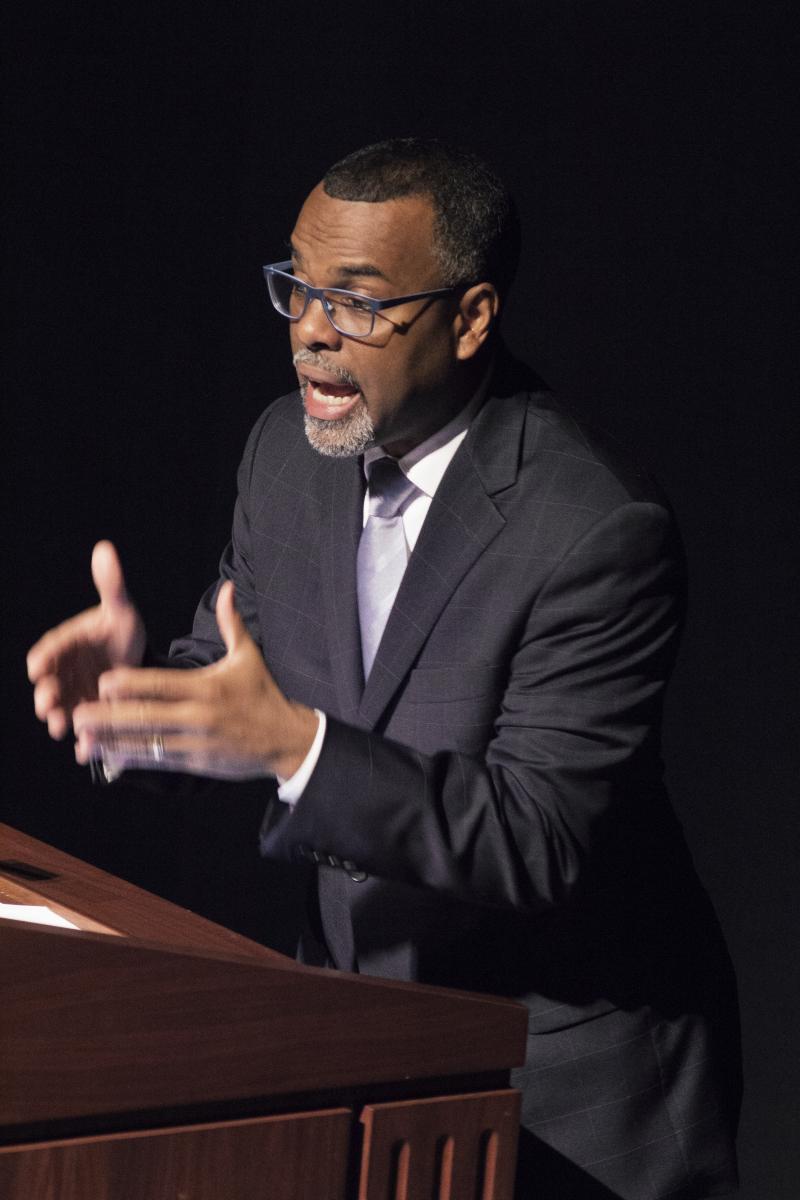Glaude Speaks on “Value Gap” in American Society in Teach-In on Race Keynote

America suffers from a deep-seated presumption that white people are valued more than others in our society, and that underlying belief ultimately prevents our democracy from functioning as it should, Dr. Eddie Glaude told the crowd gathered at the Emerson/Cutler Majestic Theatre.
“[S]omething has distorted and disfigured our national and individual character, and I call this the ‘value gap,’” Glaude said.
Glaude, chair of the Center for African American Studies and the William S. Tod Professor of Religion and African American Studies at Princeton University, was delivering the keynote address, “A Revolution of Value: A Politics for Our Time,” to open Emerson’s first Teach-In on Race, a day of panels and speakers addressing issues around race and racism on campus and beyond.
President Lee Pelton, in introducing Glaude and explaining the goals of the Teach-In, said it is crucial to confront racism, now more than ever.
“In this curious political season, bigotry and all of its various ugly forms is in full bloom in our country,” Pelton said. “The good news is its visible and in plain sight. The bad news is having bloomed, it will not drop its…petals after November 8.”
The value gap is not about the “loud racists” in white sheets; it’s “baked in” to society, he said.
As an example, Glaude recalled growing up in small-town Mississippi, where his father held a good job with the post office. When he was a boy, the family moved from one side of town to the other, and one day, while playing outside, Glaude was called the n-word for the first time.
But well before that disturbing moment, he was aware that they had moved from the black end of town to the white end, Glaude said, just by looking at the condition of the streets and the sidewalks and the buildings.
“Everything in our built environment suggested we were valued less,” he said of the black neighborhood.
America tells itself stories of redemption, Glaude said—we abolished slavery, we gave women the vote, we put an end to child labor—but every bit of “progress” is met with the “value gap assert[ing] itself.”
The Civil War and Reconstruction was followed by the Jim Crow South. The Civil Rights Movement is responded to with calls for law and order.
“Think about the election of Barack Obama,” Glaude said. “We get the vitriol of the Tea Party and a wholesale attack of voting rights. In each of these movements, there’s advancement, progress is made, but what is constant is the belief that white people matter more than others…It limits our idea of justice.”
The value gap is “in the soil,” Glaude said, perpetuated out of habit. This allows us to denounce racism and call ourselves a democracy, and at the same time, maintain a system of injustice.
He likened it to his own views on global warming. He doesn’t deny climate change; he believes the science. But you wouldn’t know it by looking at how much electricity he uses or how much gas he burns in his car.
“I’m not loud in my voice, but in my behavior, you would think I think the world is O.K.,” he said.
In order to close the value gap, we need to start calling it by name and not dance around the issue to soothe white guilt, he said. We also need to demand more from government and “strategize in the streets, in the ballot box, and in the courtroom,” Glaude said.
“If we engage in that fight, we can perhaps become the people democracies require,” he said.
Audience members lined up to ask Glaude questions; some were turned away due to time constraints.
Asked by a student about the fallout from the presidential election, Glaude said whether Donald Trump or Hillary Clinton wins, “we’re going to have to engage in a more robust, radical politics,” in order to function as a true democracy.
“We’re going to see down-ballot activism [at the city and state level],” he predicted. “That’s really going to change the center of gravity of politics.”
An audience member said that between videos of police shooting unarmed black men and the number of supporters Trump has attracted, many white people have been shocked into the reality people of color face. She asked how that sense of surprise could be harnessed to make change.
It starts by “telling better stories of who we are” as a country, Glaude said, by telling the truth about how we got where we are and pointing out the inequalities inherent in our institutions.
A student asked Glaude what we need to do to show young black people more options for success than just being an entertainer or an athlete.
“We have to free ourselves to imagine ourselves on different terms,” Glaude said. “The moment we step outside the script of their expectations of us, that’s the beginning of revolution.”
Arige Shrouf, a graduate student in the Writing, Literature and Publishing Department and a first-year writing instructor, said she really liked what Glaude said about “stepping out of expectations.
“He kept it real, which is something we try to do a lot in our classes,” Shrouf said. She said the panels on Friday touch on a lot of issues her class discusses, and she encouraged her students to attend one or two.
It’s one thing to talk about race in class, Shrouf said. “It’s another thing to attend a panel and see that your peers are interested in a topic and have an equally difficult time broaching this topic, and have an equally difficult time talking about race.”
The Teach-In on Race was sponsored by the offices of the President, Academic Affairs, and Diversity and Inclusion. Check back for more coverage.
Categories